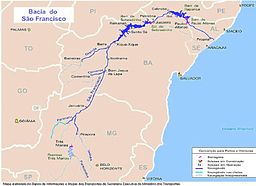São Francisco river
| São Francisco River | |
| River | |
| Country | Brazil |
|---|---|
| States | Minas Gerais, Bahia, Pernambuco, Alagoas, Sergipe |
| Region | South America |
| Source | Canastra Mountain, state of Minas Gerais |
| Length | 2,830 km (1,758 mi) |
| Basin | 641,000 km2 (247,491 sq mi) |
| Discharge | |
| - average | 2,943 m3/s (103,931 cu ft/s) |
| - max | 11,718 m3/s (413,817 cu ft/s) |
| - min | 1,480 m3/s (52,266 cu ft/s) |
|
São Francisco river basin
|
|
The São Francisco River or Rio São Francisco (Portuguese pronunciation: [sɐ̃w fɾɐ̃ˈsiʃku]) is a river in Brazil. With a length of 2,914 kilometres (1,811 mi), it is the longest river that runs entirely in Brazilian territory, and the fourth longest in South America and overall in Brazil (after the Amazon, the Paraná and the Madeira). It used to be known as the Opara by the indigenous people before colonisation, and is today also known as Velho Chico ("Old Frank").
The São Francisco originates in the Canastra mountain range in the central-western part of the state of Minas Gerais. It runs generally north in the states of Minas Gerais and Bahia, behind the coastal range, draining an area of over 630,000 square kilometres (240,000 sq mi), before turning east to form the border between Bahia on the right bank and the states of Pernambuco and Alagoas on the left one. After that, it forms the boundary between the states of Alagoas and Sergipe and washes into the Atlantic Ocean. In addition to the five states which the São Francisco directly traverses or borders, its drainage basin also includes tributaries from the state of Goiás and the Federal District.
It is an important river for Brazil, called "the river of national integration" because it unites diverse climes and regions of the country, in particular the Southeast with the Northeast. It is navigable between the cities of Pirapora (Minas Gerais) and Juazeiro (Bahia), as well as between Piranhas (Alagoas) and the mouth on the ocean, but traditional passenger navigation has all but disappeared in recent years due to changes in the river flow (see below).
...
Wikipedia


